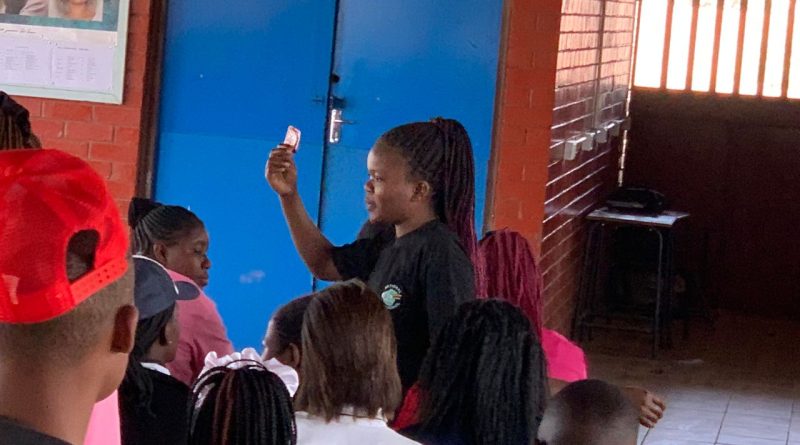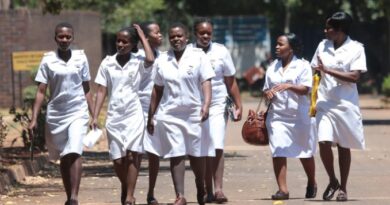No One Left Behind: Action for Youth Foundation Trust’s Quest to Achieve HIV-Free Generation by 2030
By Rachel Murondi
Action for Youth Foundation Trust has continued to raise its flag high in the fight against HIV by spearheading prevention, treatment, and care programs specifically targeting students in higher learning institutions across the Harare South Western District. The initiative has started its first phase of implementation at St Peters Kubatana Industrial Training centre emerged as a strong voice for young people who often find themselves overlooked when it comes to sexual and reproductive health and rights.
During this quarter alone, the organization successfully reached out to 556 students aged between 17 and 24 years. Through interactive engagements, discussions, and capacity-building sessions, these students received critical knowledge about HIV prevention and the importance of maintaining their health while pursuing their academic goals.
A key highlight of the outreach revealed that 387 of the 556 students reached had never received an HIV test before. This finding reflects the urgent need to scale up HIV testing and ensure that every young person has the opportunity to know their status. The organization responded to this gap by distributing 250 HIV self-testing kits, offering students a convenient and confidential way to take the first step in knowing their HIV status.
In an interview, Mr. Ashford Zulu, the SHEQ Chairperson at St Peters Kubatana ITC, said the HIV Prevention, Treatment & Care training sessions successfully addressed key aspects of Sexual and Reproductive Health Rights bridging the gap between classroom theory and taking care of your health. He noted that the supportive environment allowed students to freely express themselves and engage actively, which showed the strong demand for such programs.
Mr. Zulu emphasized that the knowledge gained, particularly on HIV Prevention and Treatment would not only enhance the students’ personal well-being but also strengthen their professional readiness.
Speaking during an interview, Ms. Cynthia Munotyaani, a Program Intern at Action for Youth Foundation Trust, explained that young people in higher learning institutions are often left out in national HIV programming. She emphasized that these students are navigating critical stages of their lives, balancing academic pressures with personal growth, and it is important to remind them to prioritize their health and well-being.
Ms. Munotyaani further added that universities and colleges are environments where young people experiment and make decisions that could affect their long-term health. This makes it vital to bring HIV prevention messages closer to them in ways that are accessible and relevant. She reiterated that the organization is determined to bridge this gap and ensure that students remain empowered with the right information and tools.
In her remarks, Action for Youth Foundation Trust Programs Assistant, Ms. Tsitsidzashe Nhongo, highlighted that knowledge on prevention is just the beginning. She explained that the organization is working to promote the correct and consistent use of both male and female condoms. By encouraging condom use, the organization is presenting students with one of the most affordable and effective methods of preventing HIV and other sexually transmitted infections.
Ms. Nhongo also stressed the importance of expanding access to Pre-Exposure Prophylaxis (PrEP) and Post-Exposure Prophylaxis (PEP) within higher learning institutions. These biomedical interventions are critical in HIV prevention, and their availability on-site would ensure that students can quickly access support when they need it most.
The program is not only about distributing information and commodities but also about shaping an environment where students feel safe to talk about HIV, ask questions, and demand services without fear of stigma or judgment. Creating safe spaces for dialogue is an important part of Action for Youth Foundation Trust’s approach.
Beyond prevention, the organization is committed to fighting stigma and discrimination that still surrounds HIV. Many young people fear testing or disclosing their status due to negative stereotypes. By normalizing conversations around HIV and empowering young voices, Action for Youth Foundation Trust is helping dismantle these barriers.
Executive Director of Action for Youth Foundation Trust, Mr. Marvin Musekiwa, emphasized the importance of spreading the message of the U=U model, which means Undetectable equals Untransmittable. This approach, also known as Treatment as Prevention (TasP), highlights that people living with HIV who are on effective treatment and maintain an undetectable viral load cannot transmit the virus to others.
Mr. Musekiwa pointed out that misconceptions around HIV transmission remain one of the biggest obstacles in the fight against stigma. Many people still believe that HIV can be spread even when a person’s viral load is undetectable. He called for more sensitization within communities so that everyone understands the science and embraces the fact that treatment not only saves lives but also prevents new infections.
He further stressed that HIV prevention and stigma reduction is not just the responsibility of organizations alone. Every member of the community has a role to play in raising awareness, sharing accurate information, and creating a supportive environment for people living with HIV. By working together, communities can contribute significantly towards ending HIV-related discrimination.
Action for Youth Foundation Trust is already planning to expand its outreach to more higher learning institutions, particularly those that have historically been overlooked by mainstream HIV programs. The goal is to ensure that every student, regardless of their institution, has access to the knowledge and tools necessary to live a healthy life.
The organization recognizes that young people are the future leaders and professionals who will shape Zimbabwe and the wider world. Equipping them with HIV prevention knowledge and encouraging health-seeking behaviors today ensures that tomorrow’s leaders are healthier, stronger, and more resilient.
Programs like these are not only about reducing HIV infections but also about fostering a culture of responsibility, empowerment, and community among young people. Students are encouraged to share what they learn with their peers, multiplying the impact of the interventions far beyond the classroom.
This peer-to-peer education model has proven effective in encouraging conversations that are less formal and more relatable. When young people talk to each other about HIV prevention, they are more likely to listen, understand, and adopt positive health practices.
By integrating HIV prevention into the daily lives of students, the organization is also supporting their academic success. A healthy student body is better positioned to perform well academically, achieve their career goals, and contribute meaningfully to society.
The program is also building leadership among young people by involving them in planning and implementing activities. Students are encouraged to take up volunteer roles, champion HIV prevention, and engage their fellow students. This leadership development component ensures sustainability of the interventions.
The fight against HIV requires a collective effort and a strong sense of solidarity. With the support of communities, institutions, and policymakers, Action for Youth Foundation Trust is confident that the vision of ending AIDS by 2030 is achievable.
As the organization looks ahead, it remains committed to ensuring that no student is left behind in HIV prevention and care. Through its targeted programs, Action for Youth Foundation Trust is inspiring hope, building resilience, and empowering young people to take charge of their health and future.
Globally, the world is working towards the goal of ending AIDS as a public health threat by 2030. Action for Youth Foundation Trust has aligned its interventions with this vision, making sure that no one, especially the youth in higher education, is left behind.
The organization believes that young people are not just beneficiaries of HIV programs but also vital change agents in shaping healthier communities.This initiative also highlights Action for Youth Foundation Trust’s work with students in higher learning which is relevant to the International Conference on Family Planning, a global conference focused on advancing Sexual and Reproductive Health and Rights (SRHR), particularly family planning, maternal and child health.
The International Conference on Family Planning (ICFP) 2025, which is a pivotal role that brings together global leaders, researchers and advocates to advance Sexual and Reproductive Health and Rights (SRHR) with this year’s theme, ” Equity Through Action :Advancing Sexual and Reproductive Health and Rights for All”, emphasizes the need for innovative solutions and concrete commitments to address health and systemic inequities worldwide.
In doing so, the organization is not just addressing HIV but is also nurturing a generation that is informed, responsible, and ready to lead Zimbabwe into a healthier and brighter tomorrow.




